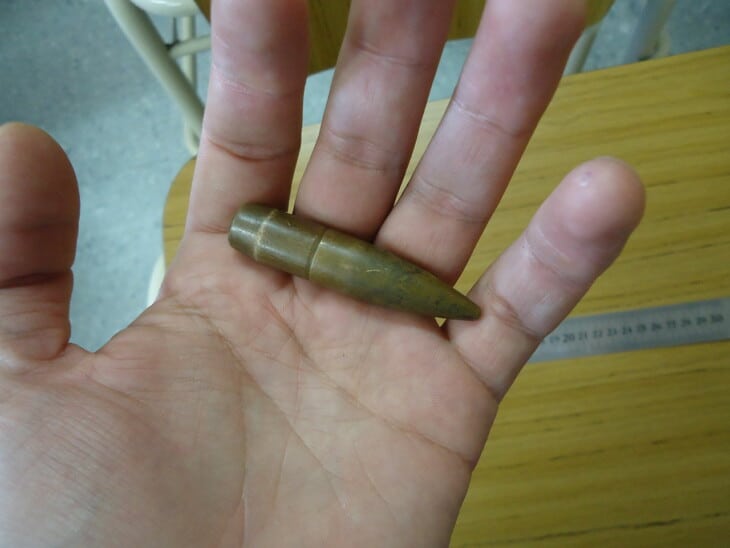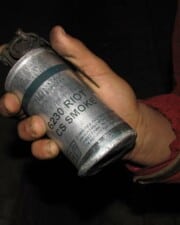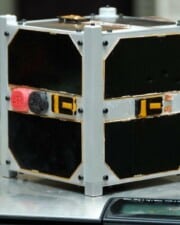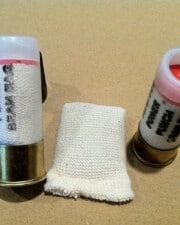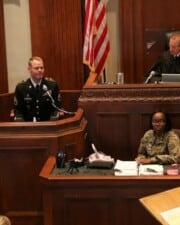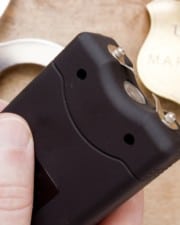While most ammunition is legal to own and carry on your firearms, there is some grey area regarding the ownership and usage of armor-piercing ammo and whether you can buy it or make it and sell it yourself.
Civilians can buy, own, make and sell certain armor piercing rounds for rifles. Still, under Federal law, you may not own or use armor piercing rounds designed for handguns, as this ammo will endanger law enforcement officials even if they have body armor.
What Are Armor Piercing Rounds
Armor-piercing rounds are bullets designed to punch through steel, kevlar, or any other type of material that would stop conventional rounds. Because most bullets are made from lead or have a lead core with a copper jacket, they will be defeated by body armor or protective steel shields.
Even hollow-point bullets, +P ammo, and other high-velocity bullets cannot penetrate body armor rated to stop bullets up to a certain size. For example, body armor designed to stop 9mm rounds would not be able to stop a .500 Magnum round, but the converse would be true.
However, body armor that would stop a .500 Magnum round would not stop a 9mm armor piercing round; this is why civilians may not own, carry or use armor-piercing handgun rounds under Federal Law.
What Armor Piercing Rounds Are Illegal To Own
The definition of armor-piercing rounds that civilians may not use is listed in US Law under Statute USC 921a 17(B) and are described as :
- “A projectile or projectile core that may be used in a handgun and which is constructed entirely (excluding the presence of traces of other substances) from one or a combination of tungsten alloys, steel, iron, brass, bronze, beryllium copper, or depleted uranium.”
- “A full-jacketed projectile larger than .22 caliber designed and intended for use in a handgun and whose jacket weighs more than 25 percent of the total weight of the projectile.”
Another round that would be considered armor piercing and therefore not permitted to be owned by civilians is steel core ammunition which can defeat an NIJ Level IIIA police issue vest.
Essentially, the law preventing the use of armor-piercing rounds in handguns by civilians protects law-enforcement personnel from deadly rounds that criminals could use and carry concealed and then produced and used with little to no warning.
If you look at the definitions above, there are two distinct areas. One is the type of material the bullet is made from and designed to be fired from a handgun, and the second determines whether the bullet can be used in a handgun.
Because armor-piercing rounds would use heavier metals to give the penetration and make it armor-piercing, the jacket of the round would add considerable weight. In contrast, standard jacketed rounds would not have that effect, and that is where the second definition makes armor-piercing rounds for handguns illegal.
What Kind Of Armor Piercing Rounds Can A Civilian Buy
18 USC 921 (a) (17) creates exceptions for armor piercing rounds as :
“The term “armor piercing ammunition” does not include shotgun shot required by Federal or State environmental or game regulations for hunting purposes, a frangible projectile designed for target shooting, a projectile which the Attorney General finds is primarily intended to be used for sporting purposes, or any other projectile or projectile core which the Attorney General finds is intended to be used for industrial purposes, including a charge used in an oil and gas well perforating device.”
This is why civilians can buy and use certain armor-piercing rounds that fall under this law section.
A good example is the M855 ‘Green tip’ .223 rounds. Although they have a tungsten core, these rounds cannot penetrate a windshield or engine block but would punch through thick bushes, thick clothing, thin steel, and glass.
But when it comes to more dense materials like modern body armor, bricks, and vehicle windshields, this round’s performance is not consistent enough to be classified as armor piercing.
The updated M855A1 round is armor-piercing and can punch through a truck engine block at 500 yards, and these are not available to civilians.
The emergence of AR-15 pistols has recently caught the attention of the ATF, and they have reclassified .223 brass bullets as armor piercing, as these can now be used in handguns. Most body armor rated to stop handgun bullets would not be able to prevent a higher velocity rifle round fired from a handgun.
So, where traditional rifle rounds can be fired from handguns, you may find those rounds could pop up on the ATF’s armor-piercing rounds radar and find themselves on the illegal to-own list.
Can Civilians Make And Sell Armor Piercing Rounds
With the availability of armor-piercing projectiles, many shooters, whether hunters or recreational sharpshooters, are producing their armor-piercing rounds for their designated sport and applications.
Armor piercing rounds are typically higher velocity rounds; this makes them an ideal option for target shooters and hunters alike, especially at long range. While you don’t need a license to produce armor-piercing rounds at home and use them, you will need a license to sell them to other specifically approved shooters.
Aside from the licenses and permits, making and selling armor-piercing rounds requires meticulous admin, and details of the type, quantity, and caliber of ammo sold and the buyer’s details must be recorded in chronological order.
While this would apply to any person making and reselling rounds, the Federal regulations that control the production and distribution of armor piercing rounds impose severe penalties for non-compliance as the uncontrolled proliferation of armor piercing rounds puts law enforcement officers at higher risk.
What License Would A Civilian Need To Sell Armor Piercing Rounds
If you are making and selling normal ammo, you only need a Type 6 or Type 7 Federal Firearm License (FFL). Still, armor piercing rounds are classified under ‘destructive devices,’ so if you want to produce and sell armor piercing ammo, you would need a Type 9, Type 10, and Type 11 FFL, but a type 11 is only required if you are importing armor-piercing rounds.
Suppose you intend to make and sell armor piercing rounds. In that case, you will also need to become a Special Occupation Taxpayer or SOT. This SOT license falls under the categories defined in the National Firearms Act of 1934, which places’ destructive devices’ like AP rounds in the same category as machine guns and silenced weapons.
What Armor Piercing Rounds Can Civilians Buy
Some of the rounds that are classified as armor piercing but can be bought and used by civilians are the 211 MOD 0 .50 BMG Round, the M993 7.62 x51 NATO round; the AP 458 .338 Lapua Magnum round, the M995 5.56 X 45 Nato round; M61 7.62X51 NATO round, and the M2 30-06 Springfield round.
While rounds like the SS190 for FN 5.7x 28 are not legal for civilians, you may find some ammo that is legal. Many shooters in their searches may come across some World War 2 black tip surplus ammo in 30-06, which is the only commercially available black-tip ammo for civilians.
Other than this round, black tip armor piercing ammo is limited to usage by Federal Government, Law Enforcement, and the military only.
References ▾
Related Posts
